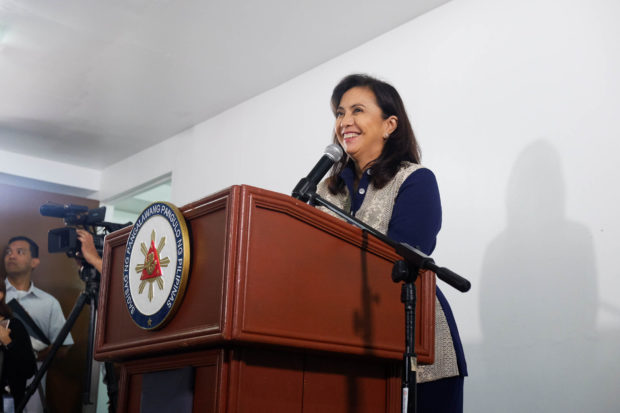
VP Leni Robredo holding a press conference about Angat Buhay, her flagship project against poverty. For the past 2 years, Angat Buhay has helped improve the lives of 155,000 Filipino families. Photo by Geela Garcia OJT.
Vice President Leni Robredo on Tuesday declared she was taking up the mantle of leadership of the opposition to President Rodrigo Duterte and said she would seek to broaden its ranks.
Robredo said she was accepting the task of uniting various organizations with disparate political positions in response to the call of “different groups moving to unite” against the administration.
“Because they have not been talking, the voices are not united as one,” Robredo told reporters at her office.
“And that’s the role I want to take — to ensure that the voices would be even more united so they could be heard, the messages could be better understood, and others holding different beliefs could be encouraged to join,” she added.
Robredo said putting up a united front and mustering the numbers would encourage more people to stand up to the government’s abusive policies.
“It is everyone’s obligation to oppose when there’s a need to oppose. But, it is becoming apparent that some are more confident in voicing out if they could rely on a group … with the same beliefs,” she said.
She said opponents of the Duterte administration also “need to agree on the terms of uniting.”
‘Positive development’
She said efforts had been made to reach out to the political Left, which were welcomed as a “positive” development by ACT Teachers Rep. Antonio Tinio, a member of the progressive Makabayan bloc in the House of Representatives.
Although they had opposed the Aquino administration to which Robredo was allied, Tinio said Makabayan was “ready to unite with and help everyone” opposed to the establishment of a Duterte “dictatorship.”
Malacañang on Tuesday said it was “hardly surprising” that Robredo has decided to lead the opposition.
“After all, she is the highest elected member of the opposition,” presidential spokesperson Harry Roque said in a statement.
He said “an active opposition has a vital role to play in a healthy, well-functioning democracy.”
He added, however, that the administration expected the opposition to promote “responsible and constructive debate” while presenting “a viable alternative platform of government to address the longstanding problems of the nation.”
Shaky relationship
Despite being chair of the opposition Liberal Party, Mr. Duterte chose Robredo to serve in his Cabinet as housing secretary, but they had a shaky relationship.
Robredo, who said she was “vocal from Day One,” was unceremoniously barred from attending Cabinet meetings in December 2016, forcing her to resign.
Another source of conflict between the country’s two highest officials was the President’s support for the Marcos family — in allowing the burial of dictator Ferdinand Marcos at Libingan ng mga Bayani and in the electoral protest of former Sen. Ferdinand “Bongbong” Marcos Jr., who had the backing of Solicitor General Jose Calida.
Electoral protest
Instead of upholding the position of his client, the Commission on Elections (Comelec), Calida sided with Marcos in support of the decision of the Presidential Electoral Tribunal (PET) to adopt a stricter 50-percent shading threshold in the manual recount of contested ballots in the vice presidential race.
The Comelec said the 25-percent shading rule was acceptable during the 2016 elections in which Marcos lost to Robredo by more than 260,000 votes.
Robredo described Calida as “not only a Marcos apologist, but also the No. 1 Marcos supporter.”
Calida headed Alyansang Duterte-Bongbong during the 2016 election campaign season.
“Even if I am not surprised that he would side with Marcos, I could not believe that a lawyer would oppose what the client (Comelec) says,” Robredo said.
Calida’s defense
On Tuesday, Calida defended his position, saying it was his duty to present what he perceived “to be in the best interest of the republic, notwithstanding the stance” of his client, the Comelec.
Robredo and electoral reform advocates warned that changing the shading threshold would disenfranchise voters.
“The ruling would grossly violate the rights of all voters in the 2016 elections as their votes that had already been duly counted and canvassed would be invalidated,” said Dindo Manhit, president of Stratbase ADRi, an independent think tank.
Claudette Guevara, secretary general of Democracy Watch, said the “true will of the Filipino electorate could not be fully ascertained if the PET would deviate from the standards by which the ballots were appreciated by the vote-counting machines.”
She said the results of the random manual audit of the polls showed “a near-perfect accuracy of 99.9023 percent for the vote-counting machines.”
“Fairness would dictate that a review of the votes being questioned should be made on the same set of rules and standards implemented during the 2016 national elections,” she said. —With reports from Christine O. Avendaño, Marlon Ramos, Anna Patricia Campos and Kristella Danielle Boo